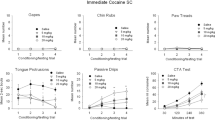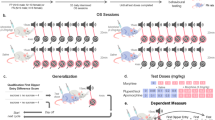Abstract
The experiments reported here investigated the mechanisms of drug tolerance acquisition in environments differing in distinctiveness. Specifically, they examined the hypothesis that tolerance acquired in non-distinctive environments might involve habituation while tolerance acquired in distinctive environments involves a classical conditioning or associative learning mechanism. In Experiment 1, rats pre-exposed to injection-ritual cues (placebo injections) prior to acquisition of tolerance to morphine analgesia in distinctive or non-distinctive environments showed a typically attenuated tolerance response on an environment-change test. The magnitude of the attentuation was not affected by the distinctiveness of the acquisition environment. In Experiment 2, rats acquiring tolerance in distinctive or non-distinctive environments, but without prior injection-ritual pre-exposure, did not demonstrate an attenuation of tolerance on an environment-change test. Tolerance acquired in either environment was unaffected by a subsequent rest period in the colony room, but was attenuated by a subsequent period of daily placebo injections in the colony room. It is argued that failure to observe environment-specific tolerance, as in Experiment 2 and in previous reports in the literature, may reflect overshadowing of environmental stimuli by injection-ritual stimuli, and are not indicative of a fundamental difference between the mechanisms of tolerance acquisition in environments varying in distinctiveness.
Similar content being viewed by others
References
Baker TB, Tiffany ST (1985) Morphine tolerance as habituation. Psychol Rev 92:78–108
Crowell CR, Hinson RE, Siegel S (1981) The role of conditional drug responses in tolerance to the hypothermic effects of ethanol. Psychopharmacology 73:51–54
Dafters RI, Anderson G (1982) conditioned tolerance to the tachycardia effect of ethanol in humans. Psychopharmacology 78:365–367
Demellweek C, Goudie AJ (1983) An analysis of behavioural mechanisms involved in amphetamine anorectic tolerance. Rsychopharmacology 79:58–66
Groves PM, Thompson RF (1970) Habituation: a dual-process theory. Psychol Rev 77:419–450
Hughes RA, Bardo MT (1978) Morphine analgesic tolerance in rats: a search for hyperalgesia. Paper presented to the Psychonomic Society Meeting, San Antonio, USA
Kamin LJ (1969) Predictability, surprise, attention and conditioning. In Campbell BA, Church RM (eds) Punishment and behavior. New York: Appleton-Century-Crofts, pp 279–296
Kesner RP, Baker TB (1981) A two-process model of opiate tolerance. In: Martinez JL, Jensen RA, Messing RB, Rigter H. McGaugh JL (eds) Endogneous peptides and learning and memory processes. Academic Press, New York
Kesner RP, Cook DG (1983) Role of habituation and conditioning in the development of morphine tolerance. Behav Neurosci 97:4–12
La Hoste GA, Olson RA, Olson GA, Kastin AJ (1980) Effects of Pavlovian conditioning and MIF-I on the development of morphine tolerance in rats. Pharmacol Biochem Behav 13:799–804
Lê AD, Poulos CX, Cappell HD (1979) Conditioned tolerance to the hypothermic effect of ethyl alcohol. Science 206:1109–1110
Lubow RE (1973) Latent Inhibition. Psychol Bull 79:398–407
Morris RGM, Jonzen RAI, Welsh B, Cahusac PMB (1981) Paper presented to Experimental Psychology Society Meeting, Liverpool, UK
Siegel S (1975) Evidence from rats that morphine tolerance is a learned response. J Comp Physiol Psychol 5:498–506
Siegel S (1977) Morphine tolerance acquisition as an associative process. J Exp Psychol: Anim Behav 3:1–13
Siegel S (1983) Classical conditioning, drug tolerance, and drug dependence. In: Israel Y, Glaser FB, Kalant H, Popham RE, Schmidt W, Smart RG (eds) Research advances in alcohol and drug problems, Vol 7. Plenum Press, New York
Siegel S, Hinson RE, Krank MD (1978) The role of predrug signals in morphine analgesic tolerance: support for a Pavlovian conditioning model fo tolerance. J Exp Psychol (Anim Behav) 4:188
Tiffany ST, Baker TB (1981) Morphine tolerance in the rat: congruence with a Pavlovian paradigm. J Comp Physiol Psychol 95:747–762
Tiffany ST, Petrie EC, Baker TB, Dahl J (1983) Conditioned morphine tolerance in the rat: absence of a compensatory response and cross tolerance with stress. Behav Neurosci 97:335–353
Wagner AR (1976) Priming in STM: an information processing mechanism for celf-generated or retrieval-generated depression in performance. In: Tighe TJ, Leaton RN (eds) Habituation: Perspectives from child development, animal behavior and neurophysiology. Hillsdale NJ: Erlbaum
Wagner AR (1981) SOP: a model of automatic memory processing in animal behavior. In Spear NE, Miller RR (eds) Information processing in animals: Memory mechanisms. Hillsdale, NJ: Erlbaum
Walter TA, Riccio DC (1983) Overshadowing effects in the stimulus control of morphine analgesic tolerance. Behav Neurosci 97:658–662
Author information
Authors and Affiliations
Rights and permissions
About this article
Cite this article
Dafters, R., Bach, L. Absence of environment-specificity in morphine tolerance acquired in non-distinctive environments: habituation or stimulus overshadowing?. Psychopharmacology 87, 101–106 (1985). https://doi.org/10.1007/BF00431787
Received:
Accepted:
Issue Date:
DOI: https://doi.org/10.1007/BF00431787




